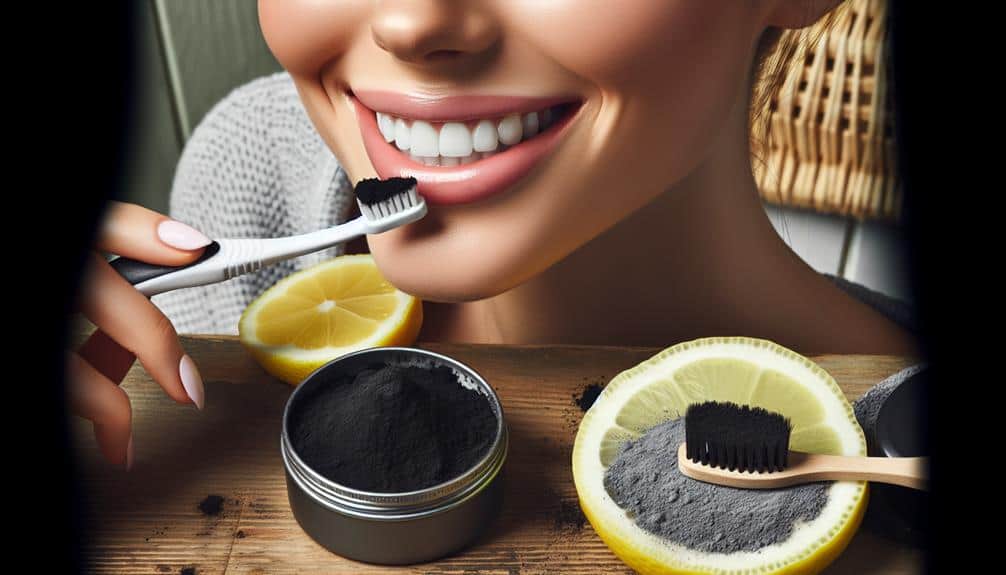For a gentle solution to whiten sensitive smiles, consider a DIY powder mix containing baking soda, activated charcoal, and coconut oil. These ingredients are effective yet mild, safeguarding the enamel while brightening teeth. Assure a smooth consistency and gentle application technique by mixing thoroughly and using a soft-bristled toothbrush in circular motions for best results. Don't forget to consult your dentist, limit whitening sessions, and maintain through regular check-ups. Additional tips and insights await to enhance your teeth whitening experience.
Key Points
- Choose gentle ingredients like baking soda and coconut oil for effective yet safe whitening.
- Prioritize sensitivity with products designed for sensitive teeth to avoid discomfort.
- Master proper application techniques for even distribution and optimal results.
- Consult a dentist for personalized advice and to monitor sensitivity during whitening.
- Maintain results by incorporating gentle ingredients in daily oral care and regular dental check-ups.
Benefits of DIY Teeth Whitening
Have you ever thought about the benefits of using do-it-yourself teeth whitening techniques? When it comes to teeth whitening, natural options are becoming increasingly popular. DIY teeth whitening techniques often involve using ingredients like baking soda, activated charcoal, or hydrogen peroxide, which are milder on sensitive teeth compared to some commercial products. These natural alternatives can help you achieve professional results without the high cost linked with professional treatments.
Many individuals prefer the DIY approach due to the control it provides over the ingredients used. By selecting natural alternatives, you can have peace of mind knowing precisely what's going into the whitening solution. Additionally, these techniques can be customized to suit individual needs, whether focusing on whitening, stain removal, or overall dental health.
While achieving professional results is possible through at-home techniques, it's crucial to research and follow guidelines carefully to ensure safety and effectiveness. Embracing DIY teeth whitening can be a cost-effective and gentle way to brighten your smile.
Choosing the Right Ingredients
When selecting ingredients for your DIY teeth whitening regimen, it's important to take into account their gentleness on sensitive teeth and their effectiveness in achieving desired results. Ingredient selection plays an essential role in formulating a safe and efficient whitening formula.
Opt for ingredients like baking soda, activated charcoal, and coconut oil, known for their gentle yet effective whitening properties. Baking soda, for instance, helps in removing surface stains without being too abrasive on sensitive teeth. Activated charcoal is another popular choice due to its ability to bind to stains and toxins on the teeth, promoting a brighter smile. Coconut oil, with its antimicrobial properties, can aid in maintaining oral health while contributing to the whitening process.
To make sure the ingredients work harmoniously, consider their individual benefits and how they complement each other in a whitening formula. By choosing ingredients thoughtfully, you can create a potent yet gentle teeth whitening powder tailored to your specific needs.
Mixing and Application Techniques
To guarantee the best outcomes, mastering the blending and application techniques is essential when preparing your DIY teeth whitening powder. When mixing your ingredients, make sure a consistent powder consistency. This is important for even distribution and effectiveness.
Start by combining the powdered ingredients thoroughly to avoid clumps that may lead to uneven whitening. Gentle application is key to prevent irritation, especially for those with sensitive teeth. Use a soft-bristled toothbrush to apply the powder gently to your teeth. Brush in small, circular motions for about two minutes to allow the powder to work its magic.
Safety Precautions for Sensitive Teeth
Implementing proper safety precautions is vital when whitening sensitive teeth to prevent any potential discomfort or damage. When dealing with sensitive teeth, it's essential to take preventive measures to guarantee the process is gentle and safe. Here are some safety precautions to take into account:
- Consult Your Dentist: Before starting any whitening treatment, consult your dentist, especially if you have sensitive teeth.
- Use Gentle Products: Opt for teeth whitening products specifically designed for sensitive teeth to minimize sensitivity.
- Follow Instructions Carefully: Read and follow the manufacturer's instructions for the whitening product to avoid overuse or misuse.
- Limit Whitening Frequency: Avoid over-whitening sensitive teeth; limit the frequency of whitening treatments to prevent enamel damage.
- Monitor Sensitivity: If you experience increased sensitivity or discomfort, stop the treatment immediately and consult your dentist for guidance.
Maintenance and Long-Term Results
Considering the importance of maintaining the whitening results and ensuring long-term effectiveness, monitoring your oral health post-treatment is essential for individuals with sensitive teeth. Sensitivity management plays a pivotal role in the maintenance phase. Be mindful of any increased sensitivity after using a teeth whitening powder, and if it persists, consult with your dentist for proper guidance. While the initial whitening effectiveness may be noticeable, long-term care is essential for sustained results.
To uphold the whitening effects, incorporate gentle ingredients in your oral care routine. Look for toothpaste and mouthwash specifically formulated for sensitive teeth to help maintain the brightness of your smile. Additionally, regular dental check-ups are recommended to address any concerns promptly and ensure the longevity of your whitening results.
Frequently Asked Questions
Can This Teeth Whitening Powder Be Used on Dental Work Such as Crowns or Veneers?
You can use teeth whitening powder on dental work like crowns or veneers, but it might not change their color. Be cautious about sensitivity and consult your dentist. Whitening products may not affect dental work as they do natural teeth.
How Long Does the Whitening Effect Last After Using the Powder?
After using the powder, results typically last for a few months with good oral care habits. To maintain whitening effects longer, avoid stain-causing foods and drinks. Consistent brushing, flossing, and routine dental cleanings support longevity of the whitening effect.
Is It Safe to Use the Powder on Children or Teenagers With Sensitive Teeth?
In pediatric dentistry, it's essential to take into account dental sensitivity in teens. When dealing with tooth discoloration, consult a dentist before using whitening products on children or teens with sensitive teeth. Prioritize their oral health and well-being.
Can the Powder Be Used in Conjunction With Other Teeth Whitening Products for Enhanced Results?
Imagine your teeth whitening journey as a symphony, combining different instruments to create a harmonious melody. Utilizing combination treatments can enhance effectiveness, managing sensitivity while delivering remarkable results. Experiment cautiously, and consult professionals for guidance.
Are There Any Specific Dietary Restrictions or Recommendations to Follow While Using the Teeth Whitening Powder?
To maximize the benefits of the teeth whitening powder, consider avoiding foods and drinks that can stain teeth, such as coffee or red wine. Eating a balanced diet rich in fruits and vegetables can positively impact your overall oral health.




